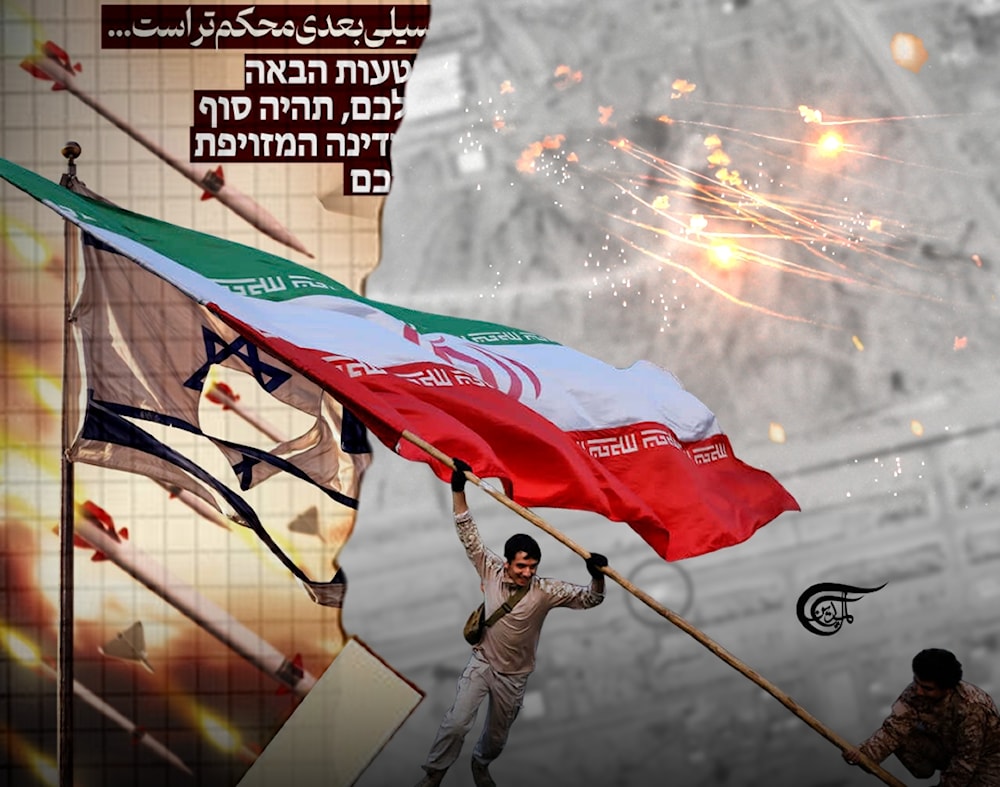Operation True Promise
An immediate indication of the new equation set after the strike is that it was reported that the planned invasion of Rafah had been postponed.
-

The Iranian response was a major strategic defeat for the Zionists. While they crowed about 99% of the drones and missiles being intercepted, it is clear that the main targets were hit. (Al Mayadeen English; Illustrated by Batoul Chamas)
In what CNN reported was the largest drone attack in world history, the Islamic Republic of Iran struck at the Zionist entity on Saturday, April 13. It was in response to the attack on the Iranian consulate in Damascus carried out a fortnight before. CNN also noted it was an operation which “seemed planned to minimize casualties”, in stark contrast to the previous six months of the Zionist genocide in Gaza.
According to the Zionists, the operation was ineffective in that 99% of the drones and missiles launched were intercepted. But of course, as the experience of the Resistance Axis shows, the most efficient way to defeat the Iron Dome system is to overwhelm and confuse it.
In addition, however, it is plain that the missiles which did strike home – in particular at the Nevatim air base near Bir Al-Sabe' and at the Ramon base some 90 km to the south – caused significant damage to the base as satellite imagery showed. F35 aircraft departed from here to bomb the Iranian consulate in Damascus.
Western media are very reluctant to even mention the other major target - an intelligence base for Israeli military intelligence, known as Unit 8200. The Zionists tried their best to suppress all mention of the attack on the top secret base, which as the Israeli press has previously noted, is the “first line of defense in preventing surprise attacks” and is an outpost that has been labeled "the eyes of the nation."
The Chief of Staff of the Iranian Armed Forces Major General Mohammed Bagheri noted that it was from there that the operation against Iran in Damascus was directed. The outpost ”is located literally inside the mountain, in tunnels dug in the 1980s” in the illegally occupied Golan Heights. It’s not only the Palestinian Resistance that has tunnels.
The Islamic Republic quoted the right to self-defence from Article 51 of the UN Charter. The Russian Foreign Ministry cited Article 51 in its own response, failing to accede to Zionist demands to condemn Iran. China too did not condemn Iran, calling its response “restrained”.
Though it was condemned by the West, some Western figures conceded its legitimacy, albeit grudgingly. British Foreign Secretary David Cameron was asked what the UK government would do if a hostile nation flattened one of Britain's consulates. He answered, "We would take very strong action". He also appeared to simply take issue with the proportionality of the strike, saying, “Countries have a right to respond when they feel they have suffered an aggression. Of course they do.”
Operation True Promise was the first direct military strike on "Israel" by the Iran. It’s unlikely to be the last. It utilised a tiny fraction of the available armaments and it showed that it can successfully penetrate the much vaunted air defence systems of the Zionist entity.
The Iranian operation was widely welcomed in the region. In Tehran, crowds gathered in Palestine Square to celebrate. They lit flares and set off fireworks. The Iranian Parliament stood as one to cheer the strike.
Meanwhile, Palestinians gathered in the West Bank chanting “God is Great” as Iranian missiles soared overhead. In Jordan, while the government collaborated with the Zionist entity, the citizens were out on the streets.
In Gaza, there were relieved observations that for the first time in months there were no drones overhead, and bombing in Rafah and the rest of Gaza was suspended.
The next day, three bakeries opened their doors in Gaza for the first time in six months.
These had reportedly been authorised by the Zionist regime, itself a scandalous indication that they had been forcibly closed by the Zionists. In the West Bank, Palestinians took matters into their own hands and tore down sections of the apartheid wall.
Unfortunately, genocidal Jewish settlers also launched a mass pogrom against the Palestinian village of al-Mughayyir, northeast of Ramallah. The sooner the settlers are driven out, the sooner peace can come. But the Iranian retaliation has certainly given confidence and increased morale to Palestinians all over the world.
Overall, it is clear that the Iranian response was a major strategic defeat for the Zionists. While they crowed about 99% of the drones and missiles being intercepted, it is clear that the main targets were hit. But the degree of destruction caused was also not the point of this demonstration. The point was to indicate that despite the much-vaunted air defence systems and the direct military support given by the US, UK, and Jordan, with indirect help from France and Saudi Arabia, among others, the Islamic Republic can evade the defences of the Zionist entity at will. As a result, a “new equation” of deterrence is being spoken of. It was reported that Iran “decided to create a new equation,” said the head of Iran’s Islamic Revolutionary Guard Corps, Maj. Gen. Hossein Salami, in a television interview on Sunday. “From now on, if Israel attacks Iranian interests, figures, and citizens anywhere, we will retaliate from Iran.”
An immediate indication of the new equation is that it was reported that the planned invasion of Rafah had been postponed. Amos Yadlin, a former director of Israeli military intelligence who advises opposition leader and war cabinet member Benny Gantz, reportedly said, “Last night’s attack could lead to a strategic change in the war and even to its end,”
Another sign was that the US let it be known that it “is privately telling officials there: If Israel strikes back militarily, it will do so alone.” The goal for Iran, as British commentator Batool Subeiti has argued, was to strike back but not to provoke a regional war, as that will simply take attention away from Gaza, where it needs to remain.

 David Miller
David Miller
 6 Min Read
6 Min Read











